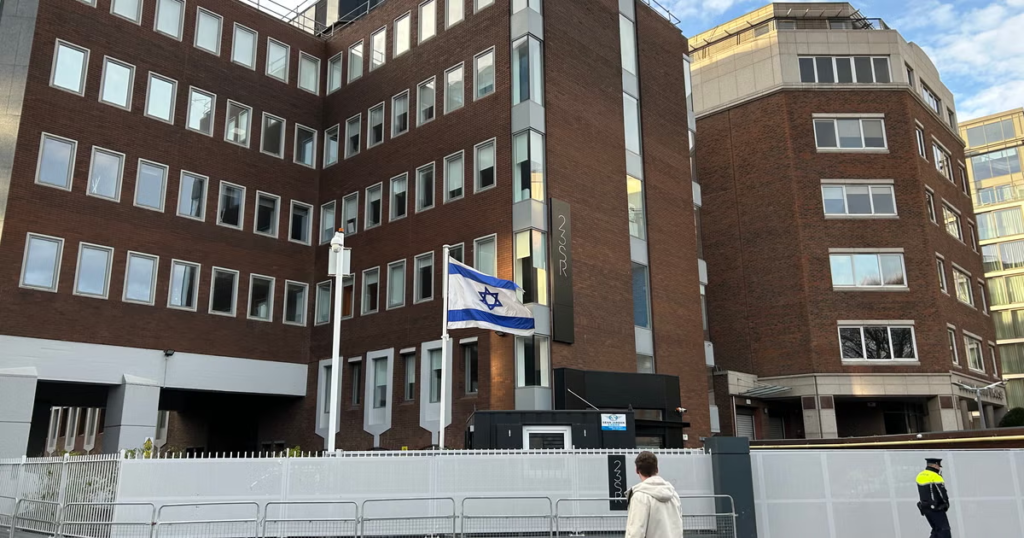Israel Closes Its Embassy in Ireland, citing what it describes as “extreme anti-Israel policies” by the Irish government. This decision marks a significant development in the already strained relations between the two countries and raises questions about the future of their diplomatic ties.
The move comes amidst ongoing tensions in the Middle East, with Israel’s foreign minister, Gideon Saar, accusing Ireland of crossing “every red line” in its stance against Israel.
Ireland’s Stance: A Point of Contention
Ireland has long been vocal about its position on the Israeli-Palestinian conflict, frequently aligning with international efforts to advocate for Palestinian statehood. This advocacy has often brought Ireland into conflict with Israel, as demonstrated by its unilateral recognition of a Palestinian state, a move that prompted Israel to recall its ambassador to Dublin in the past.
The current controversy revolves around Ireland’s support for South Africa’s legal action against Israel in the International Court of Justice (ICJ). South Africa has accused Israel of “genocide” against Palestinians, a charge that has drawn sharp criticism from Israel.
Mr. Saar has pointed to this support as emblematic of Ireland’s alleged anti-Israel rhetoric and policies. He further accused Ireland of using “anti-Semitic rhetoric” to de-legitimize and demonize Israel.
Read : Hamas Agrees to Temporary Israel Military Presence in Gaza in Ceasefire Deal: Reports
Ireland, however, has defended its position as being grounded in principles of international law and humanitarian concerns. Irish leaders, including Taoiseach Simon Harris and Tánaiste Micheál Martin, have rejected the accusation of anti-Israel bias.
Read : Israeli Foreign Minister Threatens Iran, Saying It ‘Deserves to Be Destroyed’
They have emphasized Ireland’s commitment to peace in the Middle East and adherence to international norms, with Mr. Martin highlighting the need for an immediate ceasefire, humanitarian aid, and the release of hostages in Gaza.
Diplomatic Fallout and Future Implications
The decision to close the embassy marks a low point in Irish-Israeli relations, with both sides maintaining conflicting narratives. Israel’s foreign ministry stated that it will prioritize relations with countries that demonstrate positive attitudes and actions toward the Jewish state.
This approach aligns with Israel’s broader strategy of strengthening ties with allies while re-evaluating relationships with countries it perceives as hostile.

For Ireland, the closure of Israel’s embassy is deeply regrettable but not entirely unexpected. Mr. Martin expressed disappointment over the decision, emphasizing the importance of diplomatic channels even amidst disagreements. Ireland has no plans to close its own embassy in Israel, signaling its willingness to maintain at least a minimal level of engagement.
This development also has broader implications for the European Union. Ireland has been one of the EU’s most outspoken critics of Israel’s policies in the Palestinian territories. The closure of the embassy could lead to a recalibration of how other EU member states approach their relations with Israel.
The Middle East Conflict: A Backdrop to Diplomatic Strains
The backdrop to this diplomatic fallout is the ongoing conflict in Gaza, which has intensified since the October 7, 2023, attack by Hamas on southern Israel. This attack resulted in the deaths of 1,200 people and the capture of 251 hostages, prompting Israel to launch a large-scale military operation in Gaza with the stated aim of eliminating Hamas.

The humanitarian toll of the conflict has been devastating. According to the Hamas-run health ministry, over 44,875 people have been killed, and more than 100,000 injured, with civilians bearing the brunt of the violence. The United Nations has corroborated these figures as reliable, adding to international concerns over the scale of destruction and loss of life.
Ireland has been particularly critical of Israel’s military actions, describing them as collective punishment of the Palestinian people in Gaza. Irish leaders have called for an immediate ceasefire and a surge in humanitarian aid to alleviate the suffering of civilians. These statements have further strained relations with Israel, which views such criticism as biased and unfair.
Despite these tensions, Ireland insists that its position is pro-peace and not anti-Israel. It has framed its criticism of Israeli policies as being consistent with international law and the principles of human rights. This nuanced stance, however, has failed to bridge the growing divide between the two nations.

The closure of Israel’s embassy in Ireland represents a significant escalation in the diplomatic rift between the two countries. While Israel views this decision as a necessary response to Ireland’s policies, Irish leaders have expressed regret over the move, emphasizing the importance of maintaining diplomatic communication.
This development underscores the broader challenges of navigating international relations amidst the ongoing Israeli-Palestinian conflict. For both nations, the immediate focus will be on managing the fallout from this decision while balancing their respective domestic and international priorities.

